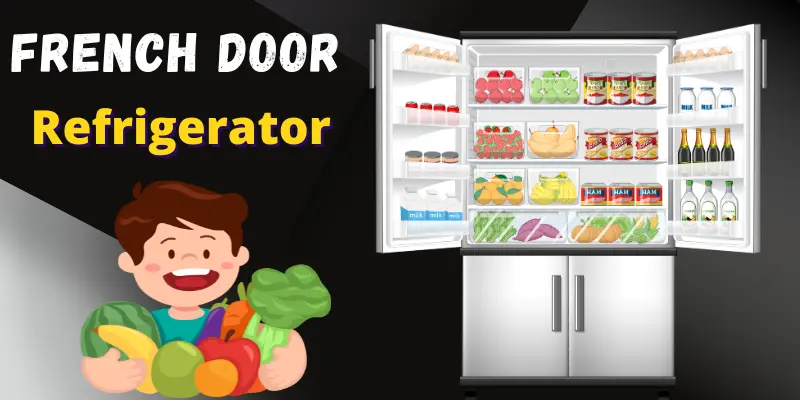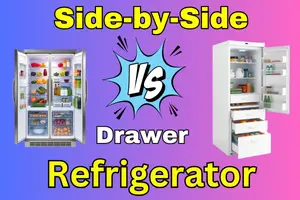What is the Difference Between a French Door and a Compact Refrigerator?
Published: 25 Sep 2025
When choosing a refrigerator, understanding its different styles is essential. Many people often ask, What is the difference between a French door and a compact refrigerator? Both types of fridges have unique designs, features, and purposes. A French door refrigerator offers spacious storage with a modern design, while a compact refrigerator is perfect for saving space and storing essentials. This article will help you understand the key differences so you can choose the one that fits your needs.
Are you ready? Let’s start!
What is a French Door Refrigerator?
A French-door refrigerator is big and stylish. It has two doors for fresh food and a freezer below. This fridge is great for families and people who need lots of space.
Features of a French Door Refrigerator:
- Two Doors for Fresh Food: Both doors open to a wide storage area for fresh items.
- Freezer Drawer Below: The freezer is a pull-out drawer at the bottom, making frozen items easy to reach.
- Large Space: It has a big capacity, good for storing food for big families or parties.
- Modern Design: The design is fancy and adds style to your kitchen.

Now that we know about the French door refrigerator, let’s move forward to the next type: the compact refrigerator.
Are you ready? Let’s go!
What is a Compact Refrigerator?
A compact refrigerator is small and perfect for tight spaces. It works well in dorms, offices, or small apartments. This fridge is great for people who don’t need much storage space.
Features of a Compact Refrigerator:
- Small Size: It fits easily in small areas like rooms or offices.
- Low Storage Capacity: The fridge can hold enough food for one or two people.
- Portable: You can move it around easily because it is light.
- Affordable: It costs less compared to larger refrigerators.

Now that we’ve learned about the compact refrigerator, it’s time to compare it with the French door refrigerator.
Next, we will look at their detailed comparison. Let’s explore!
Comparison: French Door vs. Compact Refrigerator
Now, let’s compare the French door refrigerator and the compact refrigerator to help you find the best one for your needs. Below is a table showing their key differences side by side.
Comparison Table:
| Feature | French Door Refrigerator | Compact Refrigerator |
| Size | Large, takes up more space | Small, fits in tight spaces |
| Storage Capacity | High, good for large families | Low, ideal for 1–2 people |
| Accessibility | Easy access to both fresh and frozen food | Basic access to smaller sections |
| Energy Efficiency | May use more energy | Low energy usage |
| Cost | Expensive | Budget-friendly |
Let’s explore each feature to understand these refrigerators better.
Size
When choosing a refrigerator, size is one of the first things to think about. The right size depends on your kitchen space and how much food you need to store.
A French door refrigerator is big and works best in large kitchens. It has two wide doors that need plenty of space to open, so it’s not the best choice for small areas. The extra size makes it great for families who buy and store a lot of groceries.
A compact refrigerator is much smaller and is made for tight spaces like dorm rooms, offices, or small apartments. It fits easily where space is limited and is perfect if you don’t need to store a lot of food.
Storage Capacity
Storage capacity is another important factor to think about when picking a refrigerator. How much food you usually keep will decide which one works better for you.
A French door refrigerator gives you a lot of space, with separate compartments for both fresh and frozen food. It’s a good choice for families who shop in bulk and need room for big items like trays, boxes, or leftover containers.
A compact refrigerator has limited space and is designed mainly for essentials. It works well for storing drinks, snacks, and small meals. This makes it suitable for students, office workers, or anyone who doesn’t need to keep a lot of groceries.
Accessibility
Accessibility means how easily you can reach your food inside the fridge. A good design saves time and makes daily use more comfortable.
A French door refrigerator is very convenient because both the fresh and frozen sections are at a comfortable height. You don’t need to bend much, and the double doors help you keep food well-organized and easy to spot.
A compact refrigerator has a simple design with small shelves and a tiny freezer section. Since space is limited, food often needs to be stacked, which can make it harder to find items quickly. This can feel less handy if you use the fridge a lot.
Energy Efficiency
Energy efficiency shows how much power a refrigerator uses every day. A fridge that saves energy also helps lower electricity bills.
A French door refrigerator usually consumes more energy. This is because it is large in size and has many advanced features that need extra power to run. Families who use it heavily may see higher energy costs.
A compact refrigerator is highly energy-efficient. Its small size and simple design mean it uses less electricity, making it cheaper to run. This makes it a smart choice for students, offices, or anyone with a limited budget.
Cost
Cost is an important factor when choosing a refrigerator. Some models are built with advanced features, while others are simple and budget-friendly.
A French door refrigerator is more expensive up front. It also has higher running costs because of its large size and extra features. Many families see it as a long-term investment since it offers lots of space and modern design.
A compact refrigerator is much more affordable. It fits well for people on a budget who only need basic cooling. It does not have many extra features, but it still does the job for small needs.

Now, we’ve compared the two refrigerator types in detail. Next, we will move toward the final result of this article and help you decide which one is right for you!
Conclusion
This article taught us the differences between a French-door refrigerator and a compact refrigerator. Each type has unique features, so your choice depends on your storage space, style preferences, and needs. If you want to learn more about another comparison, check out our detailed guide on the difference between a French door and a drawer refrigerator.
But this article is not finished yet! We have prepared a special section of questions and answers just for you. Don’t forget to check them out—they are made to help you even more. Let’s move ahead together and explore them now!
Common Questions and Answers
Every decision comes with questions, and choosing between a French-door refrigerator and a compact refrigerator is no different. We have gathered some of the most common questions to help you. Let’s dive into them!
A compact refrigerator is usually quieter because of its small size and simple cooling system. It doesn’t need a big motor to keep things cold, so the sound is very low. A French door refrigerator is larger and has more parts running, like fans and ice makers, which can make more noise. If you want less sound in your room or office, a compact fridge is the better choice.
Yes, French door refrigerators often come with smart features like digital screens, water dispensers, ice makers, and even Wi-Fi controls. These features make them more advanced and user-friendly. Compact refrigerators are made for simple use, so they usually don’t have these extras. If you want modern features, the French door model is the winner.
A compact refrigerator is much easier to move because it is light and small. You can carry it into a dorm room, office, or small apartment without much effort. A French door refrigerator is heavy and large, so moving it requires more people and professional help. For flexibility and portability, the compact fridge is better.
Yes, a compact refrigerator can work well as a backup fridge. Many families use it to keep drinks, snacks, or extra items when the main fridge is full. It is also handy to place in a garage, bedroom, or office for quick access. While the French door fridge handles the main groceries, the compact one adds extra convenience.
A French door refrigerator is better for keeping food fresh longer. It has strong cooling systems, humidity controls, and separate compartments for different foods. Compact refrigerators are simple and may not keep fruits, vegetables, or meat fresh for many days. For short-term storage, a compact fridge is fine, but for long-term freshness, a French door is best.
Compact refrigerators can cool drinks and snacks well, but they don’t match the power of a French door model. The cooling in a compact fridge may not be even, and frozen items in its small freezer can sometimes thaw quickly. French door refrigerators use advanced systems to keep every corner cool. For heavy food storage, the French door is stronger.
A French door refrigerator is better for entertaining guests because it has wide shelves and large compartments. You can easily fit cakes, trays, and drinks inside. A compact refrigerator is too small for party food, though it can still be useful for storing extra drinks or desserts. If you host gatherings often, the French door model is the smarter choice.
A French door refrigerator usually lasts longer because it is built for heavy use and daily family needs. With good care, it can last 10 to 15 years. A compact refrigerator has a shorter lifespan, often around 5 to 10 years, because it is lighter and made for smaller needs. If you want something long-term, the French door fridge is a better investment.
Have more questions or tips to add to this comparison? Share them with us in the comment section—we love hearing from you!
And don’t stop here! Explore our other helpful articles to make even better choices. Keep learning and stay informed!





